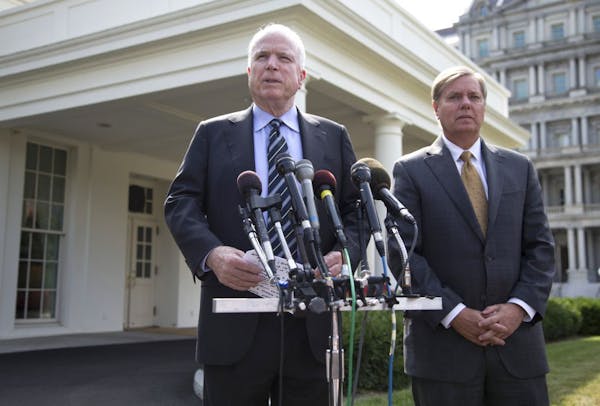On Aug. 21, evidence suggests, a chemical weapons attack in Syria killed more than 1,400 people, including at least 400 children. While these numbers are a sliver of the broader slaughter during Syria's civil war — which has killed more than 100,000 — the brazen use of chemical weapons violates global norms in place since the end of World War I's horrors. World leaders are right to condemn it, and world citizens are right to cry for some assurance that it won't happen again.
Unfortunately, the international organization designed to solve such problems, the United Nations, is neutered by Russia and China. Those countries, whose leaders seem to fear intervention when they mistreat their citizens, have routinely used their veto power as permanent members of the U.N. Security Council to thwart a U.N.-sanctioned response. This structural paralysis is a major flaw of the Security Council, since both nations are able to shield rogue regimes from global accountability.
NATO, another international organization designed for a common good, so far does not appear willing to take collective action. Sure, some NATO nations like France and Turkey, which is directly threatened on its southern border, have voiced support. But the British Parliament's defeat of Prime Minister David Cameron's call for action appears to have given governments beyond England pause.
So it's understandable that President Obama believes it is up to the United States to respond to Syrian President Bashar Assad's crossing of a "red line." It's likely that Obama will use his national address on Tuesday evening to ask Americans and their congressional representatives to back his plan for limited missile strikes to deter and degrade Assad's ability to once again use chemical weapons.
It's equally understandable that Americans and their congressional representatives are reluctant, if not aggressively against military involvement. Two major Mideast wars in the last decade have sapped support from foreign military and even diplomatic involvement. This increasing isolationism doesn't fall neatly along partisan lines. In fact, it's a rare bipartisan phenomenon. A liberal-libertarian axis, particularly in the House, appears poised to give Obama the same response Parliament gave Cameron. Such a defeat would be a watershed, if not a Waterloo, for the president and, more important, the presidency itself.
Even Obama's boldest critics should consider what a world with such a weakened president would look like. With the red line ignored, Assad may feel a green light for further murder. And the threats that presidents of both parties routinely use — "all options are on the table" — might be interpreted as empty rhetoric. That could embolden dictators even more dangerous than Assad, such as those in Tehran or North Korea, as well as nonstate actors determined to develop weapons of mass destruction. It's in America's national interest that they do not calculate that they can act with impunity.
Our allies are observing, too. And if they conclude that the United States cannot be counted on as a reliable partner, they may feel the need to develop other deterrents. While less reliance on America may be welcome in concept, a dash for weapons — including a possible nuclear arms race in East Asia to counter North Korea or even China, or in the Mideast in response to the broader sectarian war that Syria is currently a proxy for — could be far more destabilizing than the challenges in Damascus.
This does not mean that Congress should reflexively back Obama. But it does mean that thoughtful members of Congress should engage the president not just with a "no," but with alternatives that address two issues: Assad's use of both conventional and chemical weapons, and the need for some kind of cohesion, if not outright consensus, on U.S. foreign policy that would allow America to still protect and project its national interests.
Obama, too, must recalibrate. He has handled Syria badly from the beginning. His indecision on how to respond to the uprising helped create a vacuum that was partly filled with extremists, including some with ties to Al-Qaida. And in the aftermath of the chemical attack, he has been feckless in building international and domestic support.
Every alternative to military action should be jointly explored by the president and congressional leaders. Already there are several suggestions of alternatives, including giving Assad a window of time in which to disavow and surrender chemical weapons before an authorized strike. (This idea appeared to gain global traction on Monday.) Others suggest a more integrated, international diplomatic offensive. Surely there are, or will be, other ideas.
What can't be allowed to happen in Washington is that America's commander in chief is left a lame duck on the global stage for more than three years at a time of increasing international peril. This would send an enabling signal to Assad and others to further destabilize an already unsteady global order.
It's time for clear-eyed leadership in Washington. Political failure should be Obama's and Congress's own red line.
------------------------
A Star Tribune editorial. Follow the editorial board on Twitter | Facebook | Pinterest | Google+
Cut down on electronic waste in Minnesota
In Minnesota, statistical gloom amid the hope of a progressive-led boom


